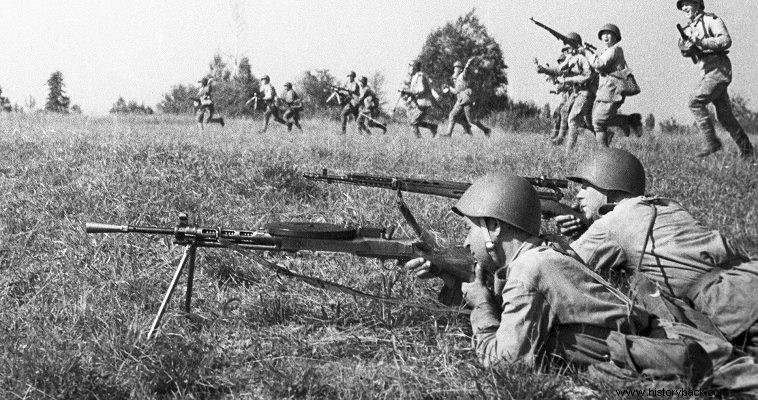
On June 22, 1944, the Soviets launched their largest attack in intensity and scope up to that point in the central part of the vast Eastern Front. Opposite them were the German Army Group (OS) "Center", under the friendly close to the Nazi regime, Field Marshal Ernst Busch.
In the early hours of June 22, strike forces of the 1st Front (formation corresponding to the Army Group) Baltic, under General Bagramian, and of the 3rd Belorussian Front, under General Cherniakovsky, moved against the German positions, north and south of the city of Vitebsk, respectively. The city had been described by the paranoid Hitler as a "fortress" and the responsibility for its defense lay with General Gollwitzer's LIII (53rd) Army Corps which had the 206th and 246th Infantry Divisions (IP) and the 4th and 6th Luftwaffe Expeditionary Divisions (MEL). The LIII SS formed the center of the German 3rd Panzer Army.
Soon both flanks of the LIII SS defensive perimeter at Vitebsk were completely exposed, just as its commander General Gollwitzer had feared, due to the retreat of other German forces. Gollwitzer immediately contacted Bush and asked him for permission to leave the imaginary "fortress" of Vitebsk, so that his four divisions would not be trapped and destroyed. His request was not heard.
The Germans tried to react to their encirclement from the north. General Gollwitzer ordered his 246th MP to attack. But the German attack was crushed in its birth by an incredible concentration of Soviet aircraft. This new defeat of the Germans resulted in the initially narrow corridors opened by the Soviet offensive spearheads, to widen dangerously on either side of the "fortress" of Vitebsk.
Gollwitzer now desperately begged permission to leave the city before he was completely surrounded. Eventually Hitler decided to allow LIII SS to be disengaged but on the condition that one division remained to guard Vitebsk. Gollwitzer had no other choice. He ordered General Hitter's 206th MP to stay back, knowing he was dooming it to death. At least, he believed, he would manage to save his other three divisions.
In the meantime, Gollwitzer had assembled his three divisions on the night of June 24 and prepared them for the departure. On the morning of June 25, the 246th MP and the 4th and 6th MEL attempted to move west, but were repulsed. The cord around them had closed and threatened to strangle them. Soon the 4th MEL no longer exists. The 246th and 6th MEL were hooked. In the meantime, Soviet forces had managed to infiltrate the city. Battles were taking place in the center of Vitebsk. At the command post of the 6th MEL, Gollwitzer saw division commander Lt. Gen. Pessl sitting in despair, along with 206th MP commander Lt. Gen. Hitter. Pesle was on the verge of a nervous breakdown.
He had a little while ago ordered one of his regiments to counterattack and from his observation deck, he saw it being torn to pieces by the Soviet weapons, at a distance of less than 50 meters from his starting positions! Gollwitzer tried to calm him down. At the same time, he informed Hitler that his own division, the 206th MP, would be withdrawn from Vitebsk, despite Hitler's express order. Only if all the SS came together was there any chance of breaking the cord, he told them. However, with one of his divisions already broken and the 246th MP trapped in the north the outcome for the Germans was already predetermined.
In the early morning hours of June 27, what was left of the LIII SS began to move in a southwesterly direction. At first, the operation to liberate the LIII SS was progressing smoothly. The trapped people managed to reach 10 km south of Vitebsk. However, the Red Air Force spotted them there and in addition to the airstrikes, Soviet ground forces were alerted and began to pursue them. LIII SS emitted its last signal at 0900 on 27 June. After this the German administration lost all contact with him.
After his last signal that they had managed to advance another 3 km they were heavily bombarded by Soviet aircraft. Gollwitzer's radio, the last one to work, was destroyed in the attack. By then only elements of the 206th MP and some remnants of the 197th MP of the VI SS had remained from the LIII SS who had joined them along the way. To the north they could hear the sounds of the last desperate battle of the 246th MP.
Gollwitzer, faced with the new situation, ordered his men to disperse into small groups and move backwards, guided by the stars, since there were no compasses. However the battle was over by the first light of the next day for the LIII SS. After new air attacks, Soviet troops swept away the last organized German resistance. Gollwitzer and Hitter were taken prisoner, along with thousands of their men. The Soviets claimed that the LIII SS lost 20,000 dead and captured another 10,000 of its men. Gollwitzer, after his release, claimed that LIII SS losses were 5,000 killed and 23,000 captured.
